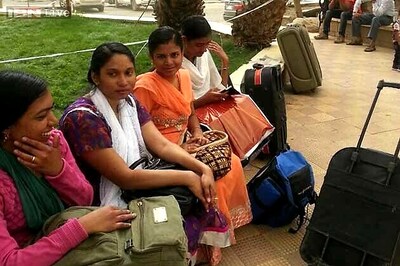
views
YANGON An ad showing a civet cat cowering in a cage being offered for sale on Facebook was just one of hundreds that the social media giant has removed in a crackdown on Southeast Asia’s illegal wildlife trade during recent weeks.
“Not too wild, not too-well behaved. If interested, call…” the seller wrote on the post, using an account in Myanmar, a major source and transit point for the trade in wild animals.
Facebook has a ban on the sale of animals on its platform.
But, in the five months through May 2020, a report seen by Reuters showed World Wildlife Fund researchers had counted 2,143 wild animals from 94 species for sale on Facebook from Myanmar alone.
The vast majority of posts – 92% – offered live animals, including birds of prey, while gibbons, langurs, wild cats, and hornbills were in high demand.
Wildlife charities said more than 500 posts, accounts, and groups were taken down in April and July after they alerted Facebook, which said its staffers remove content that breaches rules as soon as they become aware.
“We are committed to working with law enforcement authorities around the world to help tackle the illegal trade of wildlife,” a Facebook spokesperson said.
‘INCREASING IN EVERY COUNTRY’
Campaigners say the advent of zoonotic diseases like the novel coronavirus, which is suspected of having jumped from animals to humans, has not quashed demand from buyers.
Southeast Asia is a major hub in the multi-billion dollar global wildlife trade and, according to monitors, sellers are increasingly using social media due to its massive reach and private chat functions.
“It’s increasing in every country,” said Jedsada Taweekan, a regional program manager for WWF, adding that the volume of wildlife products sold online had approximately doubled since 2015.
Myanmar came under fire in recent weeks over reported plans to allow captive breeding of about 175 threatened species including tigers and pangolins. Naing Zaw Htun, a senior forestry department official, told Reuters social media had become “one of the major drivers of the wildlife trafficking”, and the aim of the captive breeding plan was to reduce poaching.
Fighting the illegal online wildlife trade poses a serious challenge for governments across the region, where many national laws lag behind, said Elizabeth John, senior communications officer for TRAFFIC, a non-government organisation.
She said Facebook had been “very proactive in trying to address the online trade” but faced a “considerable logistical challenge” monitoring posts.
A study by TRAFFIC published in early July found more than 2,489 ivory items for sale across Indonesia, Thailand, and Vietnam on Facebook and Instagram, which is owned by Facebook.
TRAFFIC said 557 out of 600 posts, groups and profiles subsequently flagged to Facebook were removed. WWF said four Facebook accounts and seven groups, each with thousands of members, were removed in response to their research in Myanmar.
The company says it uses a combination of technology and reports from NGOs and others to detect and remove content.
Relying on tip-offs isn’t good enough, said Michael Lwin, founder of Myanmar-based tech start-up Koe Koe Tech.
“Social media platforms in general need a more systematic response,” Lwin said.
(Writing and additional reporting by Poppy McPherson; Editing by Simon Cameron-Moore)
Disclaimer: This post has been auto-published from an agency feed without any modifications to the text and has not been reviewed by an editor




















Comments
0 comment